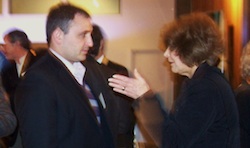By Janis Siegel , JTNews Correspondent
Some might say he’s a big shot in Bulgaria, but the 34-year-old neuro-ophthalmologist and up-and-coming European Jewish communal leader, Dr. Alexander Oscar, unassumingly mingled throughout the crowd, waiting to take the podium at the March meeting of the Jewish Federation of Greater Seattle’s Maimonides Society of Washington State event.
If he wanted to claim much of the credit for the revival of the Jewish community there, he could easily do so, but instead he is quick to say that the 7,000 Jews now living in Bulgaria, a remnant of the post-World War II population of 50,000, are thriving because of agencies such as the American-Jewish Joint Distribution Committee, which came to help immediately following the fall of Communism in the region in 1989.
“He’s a rapidly rising Jewish volunteer in all of Europe,” Michael Novick, the JDC’s executive director for strategic development, told JTNews. “Here’s a guy who knew nothing about his Jewish background and for the first time in his life, he has the opportunity to learn about being a Jew.”
Oscar didn’t know anything about his heritage until the early 1990s, when as a teen he attended summer camps and informal Jewish education programs set up by the JDC.
“I was first elected vice president of the Shalom Organization of the Jews in Bulgaria back in 2004,” he wrote in an email. “At that time I was responsible for the young people in the community.”
His trajectory has shot rapidly upward since, with roles as president of the Shalom Organization and vice president of community development for the greater Jewish community. Last year he was elected vice president of the European Council of Jewish Communities, an agency that encompasses Jewish organizations across the continent. All of these roles are as a lay leader, he noted — he also has his medical practice to keep him busy.
During his trip to the United States, Oscar touched down at Jewish agencies in Arizona, Kansas, Connecticut, and New York. Living in the city of Sofia, where 90 percent of Bulgaria’s Jews reside, Oscar told JTNews that the majority take a traditional but liberal approach to their religious practice.
“It’s a learning community,” Oscar said. “This summer, we are going to have 3,000 Jewish children from all over Europe at a summer camp. It’s attracting young people all over the country.”
Bulgaria’s majority religion is Greek Orthodox and 1.5 million are Turkish Muslims, added Oscar, but he said they have good relationships with all the other cultures and faiths in his country.
“We are very well integrated into society and very well accepted,” he said.
For five centuries, as part of the Ottoman Empire, the Jews of Bulgaria lived peacefully alongside the Turks, Greeks, and Armenians. Bulgarian Jews are Sephardic and arrived there from Spain in 1492.
Although Bulgaria was an ally of Germany’s during World War II, the Nazis had to pressure its czar to deport 11,000 Jews to the concentration camps. Afterwards, the czar refused to cooperate further with the German agenda, leaving a post-Holocaust community of nearly 50,000 lives spared.
After the war, 90 percent of the remaining Jews immigrated to Israel. But after the fall of communism, the JDC, along with the World Jewish Relief agency and the European Jewish Congress, helped them financially and logistically to establish Jewish schools and centers.
“We are helping him with the strategic plan,” Novak said.
Bulgaria has the third largest synagogue in Europe and it is the largest in the Balkans, according to historians. Bulgarian Jews recently celebrated the synagogue’s 100th anniversary.
Oscar reported that Jewish life there is ever increasing.
“Last year, we opened a Jewish kindergarten, a Jewish preschool, and a Jewish public school,” he told the group of 60 during his presentation, which included a short film documenting urban Jewish life there. “We have 700 students. They learn Hebrew. The children are teaching the parents.”
When asked about anti-Semitism today in his country, however, the doctor’s prognosis was not as rosy.
“Unfortunately, anti-Semitism in Europe and in Bulgaria is growing,” Oscar responded. “It’s all over Europe today.”
According to Oscar, a bustling tourism trade, particularly from Israeli travelers, bolsters its economy, but even that has taken a hit from rising tensions in the international community.
“We have many Israeli companies and tourists,” he said. “We had 100,000 last year, but the crisis in Turkey quashed that,” Oscar added, referring to Sept. 2011, when Turkey expelled Israel’s ambassador and publicly vowed support of the Palestinians’ move for unilateral recognition of statehood at the United Nations.
However, despite these trends, he is decidedly optimistic.
“I believe that the future is bright,” added Oscar. “I believe we will flourish in the next five to 10 years.”
Again, Oscar acknowledged that much of his confidence must be attributed to the help of the Jewish community in the U.S. and around the world.
“The JDC has been rebuilding Jewish life since the fall of communism,” Oscar said, “and our partnership is ongoing.”
